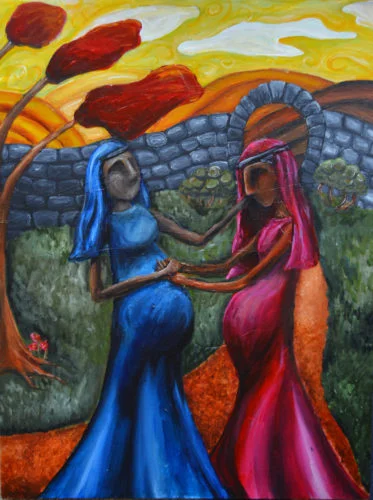 Would Mother Mary have anything to say to us today about the new tax law signed by our President today?
Would Mother Mary have anything to say to us today about the new tax law signed by our President today?
Last Sunday, at my congregation, we skipped ahead in the lectionary (this church year being so odd with the fourth Sunday of Advent falling on Christmas Eve!) I preached on Luke 1:26-56 otherwise known as the story when pregnant Mary and Elizabeth meet for the first time and giving of the Magnificat, the song of Mary.
The scripture in its entirety (STOP go read it again now it's so good) speaks to the power of women listening to God and supporting one another in resistance.
In the story, we learn that elder Elizabeth encourages Mary right from the spot as she says over her stomach: “Blessed are you among women, and blessed is the fruit of your womb.” Unborn baby John leaps on the womb in the proximity to cousin Jesus. It's a holy moment for sure.
And I tell you, there's so much to love in this beautiful text, but what has always stuck out to me is the BOLD faith of the women. For:
Though there were a thousand reasons why they could be paralyzed in fear….
Though there were a thousand unanswered questions in their stories . . .
Though the future included grave misunderstandings and hardship for those they loved dearly if they kept going. . .
On that day, Mary and Elizabeth commit together that day to STAY the COURSE.
Mary goes on to sing; “My soul magnifies the Lord, and my spirit rejoices in God my Savior!”
And the words of Mary's faith song have a lot to say about what is and isn't close to God's heart.
Mary sings of how God exalts the most forgotten.
Mary sings of how God is in the business of bringing down the powerful.
Mary sings of how God is always with us, even the most unseen among us.
Mary tells a story that is 100% countercultural to the holiday messages so deeply intertwined into our December narratives. For, she speaks a word against rapid consumerism and jockeying for positioning and winning at all costs.
She speaks a word against lifting up the rich so that the poor are trampled.
She speaks a word against those with the biggest positions or loudest twitter accounts.
She speaks a word against nationalism at all cost.
Mary's song blasts the culture with this message: God is not in your noise.
Mother Mary, you see leads the way for us reminding us that God is always in the unexpected places, in the unexpected voices and in the unexpected stories.
So, I've been thinking all week: what would Mother Mary be saying about this new tax law?
Besides just crying tears with us, I believe she'd remind us to keep our chins up. She'd say: Hope. Work. Resist. And pray for more of God's kingdom to come to earth.
And I believe she's remind us that God's favor is never on the side of kings, rulers or any governing body that does not "fill the hungry with good things, and sent the rich away empty."
She's tell us not to trust in those who say they love God with their lips but whose actions do not "lift up the lowly."
And she'd tell us that the most important moment in her life was also challenged because "a degree went out from an Emperor" but yet the light of God appeared even still.
May God have mercy on us and those that are hurt by those our laws hurt in the meantime. And may we keep singing songs like Mary's. Oh, how we need to hear them!
Excerpts of a sermon preached a Springfield Christian Church, Springfield, VA on Micah 5:2-5, Luke 1: 46-55
There’s a reason that songs like “New York, New York” and “Hollywood” are so popular. We love singing about the cities where “If you can make it there, you can make it anywhere” because there’s a popular assumption in America that if anything really good happens, it will come out of a big city.
Because of these facts, it’s so easy to believe that important things happen in important towns. Period. If you don’t live in an important town, oh well. . . not much is going to go on.
But is this always the case?
When I say, Seneca Falls, NY, you know it. Why? The women’s movement.
Seneca Falls, a once sleepy town of a few families rose to prominence when Elizabeth Candy Stanton decided to organize a gathering that became THE start of a woman's right to vote.
When I say Selma, you know it. Why? The Civil Rights Movement.
We know of Selma, a sleepy town of a few thousand residents in the middle of Alabama, because of that fateful day on March 7, 1965 Martin Luther King, Jr. and thousands of supporters dared to say segregation would no longer be tolerated.
When I say Plains, GA, you know it. Why? Because of Jimmy Carter.
Plains, a central GA town of still only 688 residents today was the birthplace and still is the homestead of Jimmy Carter, the 39th President of the United States. Who would have thought that a peanut farmer would one day be at the center of American history both in and out of office?
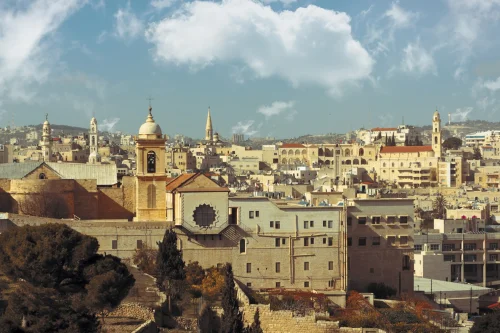 And such seems to be the message of Micah chapter 5. The prophet Micah opens the chapter he says this hopeful word about the nation of Judah’s restoration: “But you, O Bethlehem . . . who are the one of the little clans of Judah, from you shall come forth from me one who is to rule Israel.”
And such seems to be the message of Micah chapter 5. The prophet Micah opens the chapter he says this hopeful word about the nation of Judah’s restoration: “But you, O Bethlehem . . . who are the one of the little clans of Judah, from you shall come forth from me one who is to rule Israel.”
Micah is writing around 760 BC a time the nation of Judah is living under siege from the the Assyrians. They’d invaded the region and their military prowess was bar none—so weren’t going away anytime soon. You can imagine that folks feared for their safety and their security in the future.
And this was the word of the LORD: a new ruler is going to come out of Bethlehem.
I can image the disbelief of those who heard this prophetic message. “You’ve got to be kidding me! Why not Jerusalem or at least some other town . . . Not tiny Bethlehem! Times are hard. We’ve got to do better than that!”
Even though Bethlehem was the the hometown of David, and historically they’d already been through this before--- when Samuel was told by the LORD to go there to anoint the next king of Israel from among the sons of Jesse—the fact in Micah’s time was UNBELIEVABLE as well.
So hope from “one of the little clans of Judah?” Not exactly a New York or LA kind of dream . . .
In Luke's gospel two cousins, Mary and Elizabeth meet up. Filled with wonder of their unexpected and unlikely pregnancies,  they both knew one thing: God was with them. And in Mary’s case quite literally.
they both knew one thing: God was with them. And in Mary’s case quite literally.
For as soon as Elizabeth saw her with child cousin, we are told the Christ child leap in her womb. And in response, not only did Elizabeth exclaim about Mary, “Blessed is the fruit of your womb” but Mary is so overcome with thanksgiving she begins to sing. Saying, “My soul magnifies the Lord.”
And the song, known in our Christian tradition as the Magnificat, is the original radical Advent carol.
Hear these words of Mary: “My spirit rejoices in God my Savior, for he has looked with favor on the lowliness of his servant. . . . [God] has shown strength with [God’s] arm; he has scattered the proud in the thoughts of their hearts. He has brought down the powerful from their thrones and lifted up the lowly.”
I’m not sure Mary would be impressed with our modern-day celebrity figures, presidential candidates or even Barbara Walter’s list of “The 10 Most Fascinating People of 2015” Nope. She speaks of how God has “filled the hungry with good things.”
Famed Episcopal preacher, Barbara Brown Taylor says this about Mary in her book, Home by Another Way: Mary sings, “for every son and daughter who thought God has forgotten the promise to be with them forever, to love them forever, to give them fresh and endless life.”
Mary’s song is the theme of the hopeless!
And it’s like the songs lifted up throughout the pages of scripture by other “lowly ones” come before her.
Such as ones by Miriam, Moses’ sister who sings of the “horse and the rider being thrown into the sea” as the LORD delivers the children of Israel from Egypt.
Ones like from Hannah, barren and without any status from her family or cultural system, sings when she learns she’s pregnant of how “the bows of the mighty are broken but the feeble grid on strength.”
Ones from the unknown Psalmist of number 146 which speak this: “The LORD watches over the strangers, upholds the orphan and the widow.” (7-9).
These songs are resistant songs, much like Mary’s carol. Songs which beat with the sound of God’s heart for those who we’d never expect to get to know! The world may forget, but God does not!
Are you seeing the picture?
 This weekend, my husband and I were a part of a mission in Honduras. As we celebrated Christmas with a group of boys at orphanage each boy received a Christmas present. It’s not an unusual tradition for it now happens every year, but for a couple of the two youngest boys new to the center, it was completely new.
This weekend, my husband and I were a part of a mission in Honduras. As we celebrated Christmas with a group of boys at orphanage each boy received a Christmas present. It’s not an unusual tradition for it now happens every year, but for a couple of the two youngest boys new to the center, it was completely new.
One of them, I'll call him Luis, recently came to the center because his other brothers all died in gang shoot out. His mother was afraid for his life and took him to the country’s social services to ask for him to be placed in a home where he wouldn’t be killed by the men in the gangs too. She could not bear to lose one more son. His adjustment to life without his mom and his brothers hasn’t been easy but slowly Luis is finding his place in his new safe home.
During the Christmas celebration Luis’s name was called to come forward and receive his present. And in his package he found a remote control toy car. After returning to his seat, we later learned that Luis bowed his head, closed his eyes and prayed:
The look of joy, his teacher said, on his face beamed with pride! A dream come true for this 9 year old happened!
This to me, was a picture of what lifting up the lowly is all about. A child in a Honduran orphanage who thanked God for his first Christmas present!
For when I see God come in my life, I most assuredly see God in the faces of kids like Luis.
This is what I most want to offer you today when God comes—God not only keeps God’s promises and sends messengers and gathers us together but God lifts up the lowly.
The only question is will we see our Lord this Christmas? Will we make room for this great surprise?
But Mary treasured all these words and pondered them in her heart. Luke 2:19
 I've adored this verse of scripture for as long as I can remember.
I've adored this verse of scripture for as long as I can remember.
I can just see Mary quiet with newborn Jesus on her lap. And adjusting to her new life. Not only to the nightly feedings, the cries of her babe and the natural recovery from childbirth, but the spiritual "Oh, my goodness" moment of what had just happened. They called her boy Emmanuel.
So how could silence not be her first response? Staring at the little one who just came out of her body was overwhelming, I am sure, just like any new mother could tell you. But there was also this practice of be-ing, without any distractions that her Jesus called her into.
For these reasons and so many more, I've been so thankful to the narration of Luke's gospel for including this simple sentence about Mary.
It gives reflective types like me, hope. Our work of sitting and silence is more important sometimes than any words we could muster up.
Silence can be a good friend.
Over the last month, so much about the Hagan household has shifted. Kevin, my husband, has accepted a new job. I've had to give notice at a job that I love. We've been invited on a new spiritual journey for known and unknown things to come. And, the only way I think to move through it has been in the footsteps of Mary.
Sitting. Shifting. Holding on what has been good. Treasuring the gifts of the surprises. Treasuring the gifts of deep wounds. Treasuring the gifts of the people who have intersected my path in this season with joy! And also trying not to listen to those voices the breed in me anxiety, worry and despair.
Though there are a thousands things I know I could say to you, my online community of friends, this is a time for me to be quiet. There's a season for everything, isn't there? The work of treasuring, I think takes you whole attention. After all, it's the season of Lent, a time in the church year where stillness is offered to us as a refining gift.
So, until it is time to write again (which may be soon; who ever knows?) you know where I'll be.
In my big red chair in my home office, on a walk around my neighborhood, or sitting with a coffee cup in hand with a dear one here in Oklahoma, allowing the gifts that only this time and place to seep in.
This preacher on the plaza has a full heart.
When we think what will make our Christmas really amazing this year, I’m sure all of us have some ideas . . .
Or, in my case no flight delays on Christmas morning . . .
It’s true: we come to this time of year with lots of expectations.
We want Christmas Eve to be magical full of light and love.
We want Christmas morning to be charged with feelings of peace on earth and no more cyber terrorism.
And if we are a parent, we want the days between Christmas and New Years’ to go by really fast so school starts soon . . .
But have we ever thought about Christmas as the day when nothing went as planned and God’s greatest blessings were completely unexpected?
This is the familiar story that we know: Mary has just gotten the word from the angel Gabriel that she is to bear a son, from the Holy Spirit whose name will be called Jesus.
Beautiful words to start a story, right? But, let’s think about it all from Mary’s perspective. What happened to Mary was nothing she ever planned.
It wasn’t as if Mary came from a life situation where having a child so young, some scholars believe she was as young as 14, was a welcomed joy.
It wasn’t as if Mary was born into royalty where she received a health care plan at Herod’s expense.
It wasn’t as if she had access to the best midwife care in her town.
It wasn’t as if Mary’s very life wasn’t at risk for bearing a child, no matter if this child was the son of God or not.
And, from the information scripture does not give us, we can assume this too: Mary did not come from a supportive family situation.
Never do we hear of her mother, or her father. Or, anyone for that matter that is coming to her aid.
One preacher friend of mine puts it like this: “What Mary does not have is sonogram, or a husband, or an affidavit from the Holy Spirit that says, ‘the child is really mine, now leave this poor girl alone.’ No teen pregnancy organization surrounding her with support.”
So, where was God in such a bewildering time like this? How on earth was she going to get through this especially as her body was changing more and more every day?
 Enter into the picture, Mary’s older cousin, Elizabeth.
Enter into the picture, Mary’s older cousin, Elizabeth.
Another unexpected thing happens in this family---
Elizabeth, at an unknown age way past childbearing years, has found herself pregnant too. Though thinking for years that she was barren and thus, looked upon in society as second class beyond her already lower status state, a child comes to her womb too.
Her son will be named John and will be given the responsibility to prepare the way for the Christ.
So when Mary had the idea of setting out to see her cousin Elizabeth, it was an important meeting for them both. These two—together—might just have some insight into what this crazy God they worshiped was all about.
Then as soon as Mary greeted Elizabeth, Elizabeth’s child is recorded as “leaping in her womb.” It was a prophetic sign that even in spite of the confusion swirling around both of their lives something greater than both of them was occurring. God was very close.
And for the next three months, these two unlikely prophets and prophetic children they are carrying, come to see how their state of being can be considered a blessing.
Rev. Barbara Brown Taylor writes about what occurs with Mary’s state of mind as a result of being with Elizabeth: with her “the young girl doesn’t have to explain her situation to Elizabeth or ask her questions in search of answers, even to ask for acceptance.
When Mary sees her older cousin, Taylor imagines, she sees a ‘gorgeous’ woman, not gorgeous by ordinary standards, you understand, but so full of life that is hard to see beyond her joy.”
The unexpected thing that happens from the moment Mary walked into Elizabeth and Zachariah’s house is that Elizabeth became for Mary the mother figure or spiritual mentor that she needed to re-frame the story of all that was happening to her.
And so as the baby Jesus leaps in Mary’s womb, it is Elizabeth who speaks blessing over Mary’s life in a way that she could only have really heard from her: “Blessed are you among women, and blessed is the fruit of your womb.”
Elizabeth re-narrates this thing that has happened to her cousin in a way she could understand it to be the goodness of God coming to her. Elizabeth gives Mary language to understand this blessing so she can praise God for it!
And through Elizabeth’s loving care, Mary would begin to see that what was happening to her not as “that day that ruined my life” or “some unfortunate circumstances” but a blessing!
I love Elizabeth for this reason—and believe we all need more Elizabeth's in our life (no pun intended!)
But it’s important to say here that as Mary gained this new supportive friend, noting about the hardship of her situations really change (or Elizabeth’s for that matter).
A lot of hard stuff was next! Mary needed to tell Joseph some unwanted news. Soon she would have to endure the stares at the marketplace (everybody wondering, who is Mary’s baby daddy?). And Mary would still have to meet the sharp pains of childbirth in ancient Palestine without much help.
But she would not be alone. Elizabeth would be with her in spirit. God’s son would be growing in her belly.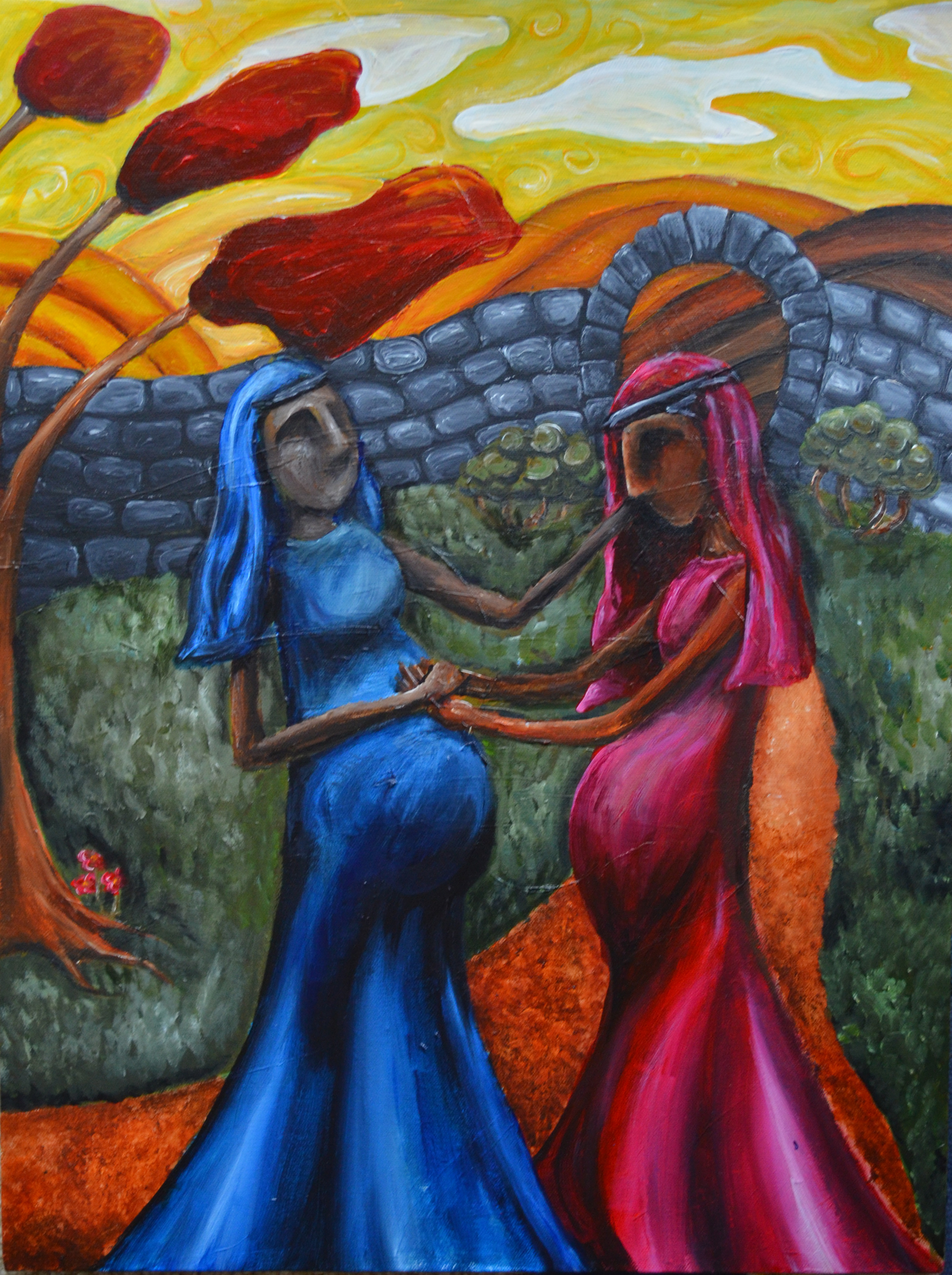
And even thought Mary may not have understood why God choose her, there was a lot to sing about.
That afternoon at Elizabeth’s house, Mary was the unlikely soloist in God’s choir (who knows if she could even carry a tune) but she sings: “My soul magnifies the Lord, and my spirit rejoices in God my Savior . . .. Surely, from now on all generations will call me blessed; for the Mighty One has done great things for me, and holy is his name.”
But, Mary could have been angry.
She could have been overtaken by fear.
She could have protested to God—this is not how the first Christmas should be! I don’t want this part in the play!
But she doesn’t.
She makes the choice to receive the unexpected. She welcomes God into her very being.
Maybe not in the way that history always tells her story—passive full of blind submission, but I believe with maturity that could have only came from sticking close to dear ones like Elizabeth and to her own spiritual instincts.
And as Mary sings about how God “has looked with favor on the lowliness of his servant” she is embodied this new direction of God’s song for all people!
For in God choosing her a peasant girl, God is saying loud a clear, the economic and social tables of this world will soon be turned upside down. A new world order is coming in the kingdom of God that Mary’s child will preach and proclaim. Everything will change!
The most unexpected blessing of all would be that the fruit of her womb, Jesus, would soon bless ALL people of the earth. You and I would not be sitting here today if Mary had not received God’s unexpected gift.
And isn’t it true? God’s unexpected gifts are always better than we could imagine!
So I ask you again, what are you expecting this Christmas?
Anon, a leader of the Islamic faith recorded this prayer about the coming of blessings:
I asked for wisdom...
And God gave me problems to solve.
I asked for prosperity...
And God gave me brains and the strength to work.
I asked for courage...
And God gave me danger to overcome.
I asked for love...
And God gave me troubled people to help.
I asked for favors...
And God gave me opportunities.
I received nothing I wanted.
I received everything I needed.
My Prayer has been answered.
I shared this prayer because I have seen it come true time and time again in my life.
How often have I set out on a life path thinking, I know exactly how the story is all going to end, only to land somewhere different? But ultimately is better if I’m walking in the ways of the Spirit?
Just think for a moment where in life you were on this day—December 21st or hereabouts last year?
What were you consumed with? What were you worried about? What were you spending most of your time on?
I think about my own life—last Christmas, sort of sad. I was thinking about how much I had to say but no place to say it. But now, I am having so much at The Federated Church.
If we take just a moment to gain some big picture perspective, what we’ll find is that God is doing unexpected things in our lives all the time. He’s making crooked paths straight. He’s leading us into new relationships. He’s opening doors where life’s cruelties have shut windows.
But the question for us is—how are we responding?
Are we blocking the movement of the Holy in our lives by being consumed in things that really don’t matter much in the end?
Are we blocking the moment of the Holy by refuses to see what are the best choices for our life’s routines?
Are we blocking the movement of the Holy by our own stubbornness to believe this unexpected story of redemption?
 Today, my friends let us take some encouragement from Mary. Let us follow in her footsteps and make the choice to believe. Knowing that as we do, an Elizabeth is on her way—whoever she may be—to inspire us for all that lies ahead.
Today, my friends let us take some encouragement from Mary. Let us follow in her footsteps and make the choice to believe. Knowing that as we do, an Elizabeth is on her way—whoever she may be—to inspire us for all that lies ahead.
Let us not let one more moment pass in this busy time of year where we don’t make room in our hearts for more peace, more hope, more joy and more love.
Why?
Because tis the season for Christ to be born and we need to get ready!
“Oh come my heart, Lord, Jesus, there is room my heart for you.”
AMEN
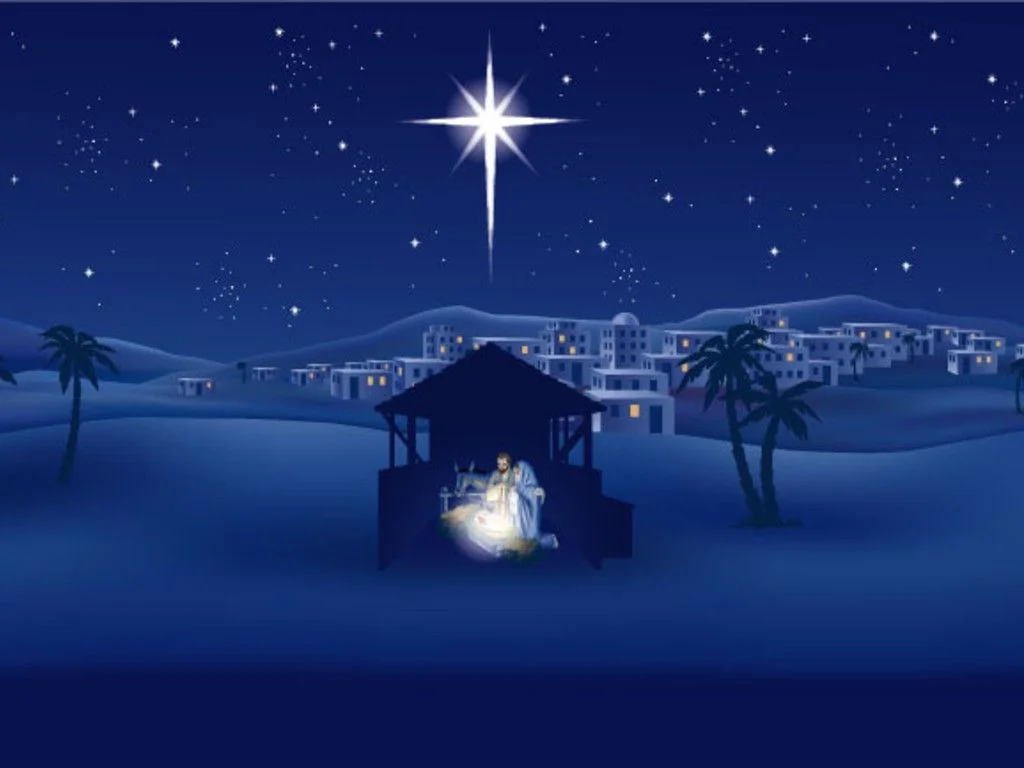 Luke 2:1-20
Luke 2:1-20
Christmas Eve 2012
Silent night, holy, night, all is come, all is bright. Round yon virgin Mother and Child . . .
I get chills every time I sing this song, especially on this night. I don’t know about you, but it seems to be the one carol of all Christmas carols that seems to pull at the strings of all of our hearts—a song that reminds us to slow down be still and consider what the birth of this child of a babe called Jesus is all about. It’s a song sung a few hours ago in the Holy City to commemorate what happened in this very special locale. Some say it wouldn’t be Christmas in Bethlehem without it.
In fact, I dare say, many of you would just not think it is really Christmas until you sing Silent Night by candlelight in community with others—just as we are going to do a in few moments. Maybe it is just tradition. Or maybe it is softness of this lullaby that evokes memories of when we were children. But, regardless as to why, Silent Night seems to be the carol for many of us that symbolizes the fact that on this night, it was not an ordinary night—it was eternally special.
It’s beautiful isn’t it the way we think of the Christmas story every year? Just like this song, we think of Christmas as peaceful, quiet, and so holy that we almost have to whisper so to honor the words . . . . Mary sleeping, all covered up in a long flowing robe with her hair perfectly combed to the side. The baby cooing, drifting off to sleep too while Joseph stands there, staff in hand, perched over the manger, with superhuman new dad strength to stay awake. The barn animals bowing at the newborn while the shepherds stand around in amazement of “the good news of great joy for all people . . . a Savior who is Christ the Lord.” It’s almost as if all the characters are glowing as we think of them, iconic in our minds just as we’ve seen them portrayed in stain glass windows cathedrals or in portraits.
We like Christmas this way. We like knowing that a hush fell over the crowd. We like proclaiming that “all is calm, all is bright.” We like pretty people doing beautiful things like giving birth. We like singing joyful songs about “good tidings to all people” believing we’re doing just as the angels did long ago.
It’s almost as if Christmas is the one time of year when we get to take a time out from all that is wrong in our world and believe again that peace on earth is actually real or at least has hope of coming to us at a time in the near future. Christmas provides so many of us the beauty that we crave in our oh, so messy world. Maybe that is why you came to church tonight—to find something anything that is better than what you were dealing with before you walked in these doors a few moments ago.
I hate to burst your bubble tonight and question some of this sentimentality of this moment. But, I think it would only be fair to the passage before us tonight we examined it more closely.
Though yes, Mary may or may not have been fully covered in long flowing robes, fit for the mother of the Son of God and her hair may or may not have been perfectly combed (probably not), remember this is a story about giving birth.
Giving birth, as many of you have experienced it is indeed labor. It’s full of sweat, tears, anguish, screams of “Get this baby out of me now!” It’s a messy enterprise, especially when you are going at it alone with no one to help you know what to do. (For Luke does not tell us that a midwife assisted with the birth). The main event of this night was about a long period of physical pain, agony, and maybe even some four letter words (or at least thought of them) coming to the forefront of Mary’s mind— what was God really thinking sending her far from home to have a baby in a stable? All was not silent, all was not bright.
And while yes, Joseph, may or may not have been staying awake, doing his good manly diligence of making sure his wife and newborn baby were indeed ok at all times, remember this is a story about an adoptive father.
Accepting a child as a man who you know is not your own can be more difficult than it might seem on paper. In this babe as Joseph stared into the manger, he did not see his eye color in the babe. He did not see his same thin lips or curly brown hair. Even more so, feelings of insecurity ran through Joseph’s bones as they would anyone forced from the resources of home now with a new baby in tow, a baby he was going to need to learn to love and care for as his own. I can imagine thousand thoughts of “what if?” ran through his head, even as relief settled into him that the baby was born and Mary seemed to be doing alright. What was God really thinking putting him up close and personal of this crazy plan? All was not silent, all was not bright.
And while yes, the barn animals and the shepherds may or may not have been looking lovingly into Jesus’ eyes well-mannered and glowing with excitement of finding the one “wrapped in bands of cloth and lying in a manger,” remember this is a story about characters who aren’t used to getting much attention.
They’re field animals and workers who aren’t known for their being in close quarters with others. They don’t know where to sit. They don’t know what to say. When Joseph’s nose starts leaning over toward them the begin to realize they smell and aren’t really fit to be good company. Soon their social anxiety seems to want to get the best of them. They wonder why they came in the first place. Sure, those angels sang and it was quite a sight, but after awhile they could easily begin to second guess all of this in the first place. What was God really thinking dragging them to out to see this? In their troubled minds, all was not silent, all was not bright.
I almost feel sacrilegious in saying anything against the beauty or the time-stopping wonder of that first Christmas Eve. But, I really think as wonderful and as life changing and as powerful that wondrous night of the birth of Christ was—or Emmanuel, God with us came to earth—all was not silent, all was night bright.
Remember this was a human story—filled with human things we know a lot about.
Changing patterns in the night sky
Tyrant governors who declare we must pay more taxes and cause even expectant mothers and fathers to make out of the way trips
Women who give birth without medical professionals to help
First time parents wondering what in the world they’ve gotten themselves into
The awkward dance of human relationships
Strangers showing up at our door who we don’t expect
And because this was a human story, as much as Christ came it didn’t make everything 100% right way. The shepherds didn’t suddenly get the respect they deserved and a fair labor. Mary didn’t suddenly have any more discomfort from birthing a baby. Joseph didn’t suddenly have all the courage he needed to keep doing the right thing as he’d done so far. No, all was not calm, all was not bright.
But, what did Jesus do—what was the point? What are we celebrating tonight then if all was not calm, all was not bright?
Well, despite the circumstances or the flavor added in by the human characters, this remains this same: on this night, we celebrate Jesus, the one who was called Savior, Christ the Lord. We are celebrating the coming of the one to earth who would give all of us an opportunity to know what God is like in the flesh. We are celebrating the One who would later show us on a cross and on an Easter morning what God ultimately wants to give us—new life. We are celebrating the coming of light—light that would begin to shine and ultimately as this Jesus grew up, show us more of God’s love. Over time, as the story unfolds, more and more of his hope would be given to all of us.
Jesus comes as the light, the light that shone in our dark, dark world. A world where all was not silent, all was not bright.
What good news this is to our weary worn eyes tonight! What good news this is for us faithful churchgoers who have heard the Christmas story over and over again and wish our lives would change and so many remains the same year after year! What good news this is for those of us who want to follow Jesus but find our own depression, anxiety, fear or hurting hearts holding us back! What good news this is for our conflict filled families who will bicker around the Christmas table tomorrow! What good news this is for a world where little girls and boys and devoted teachers get shot on Friday mornings the week before Christmas!
No matter what may be, Jesus is the light!
And, though it is true and the light has come, we, like the first participants in the Christmas story, are residents of this world. We also must face the doubts of “Why me, God?” We also must face the loneliness of being close to the light and sometimes finding few are with us there. We must also face the anger of why bad things happen to so many seemingly good people.
But this does not change the light! We, my friends cannot change the light. No matter how we whim, or moan or mess up or what folks with guns or bombs may do, we cannot change the light. The light has come!
Jesus, this babe would later grow up to say, “In this world you will have trouble. But take heart, for I have overcome the world!”
And to you this night I say, take heart. Even on Christmas, you still live in a world of trouble. But the light has come and the darkness, no matter what, could not overcome it.
AMEN
Advent 2
Luke 1:39-56
Around mid-December, it’s so easy to want to rush on through, say Christmas is here, and let’s pack up the decorations, open up the gifts, eat another turkey and move on. I know for several of you who attended and participated in the choir concert yesterday—feel as though the joy of that event has made it seem like Christmas has already come and passed. Wasn't it just a wonderful afternoon?
But thank goodness scripture, as we read it together every week in worship, wants to slow us down. Thank goodness scripture wants us to savor every moment of this season. Thank goodness scripture helps us see clearly that the journey of Christmas was not just about the destination birth, but about the journey to get there. And, we’ve got several more weeks left to wait and see what we uncover as we’re intentional about our waiting.
As we continue our Advent series this morning on waiting for Christmas—today, waiting with Jesus’ mother, Mary—it is important to remember what a radical perspective we have before us.
Luke’s gospel, where our lection for today comes from, is the only book of the Bible to narrate from the perspective of or to include women as main characters. For example, Mark’s gospel doesn’t mention Mary and skips the birth story of Jesus altogether. Matthew’s gospel assigns Mary the obvious role of birthing Jesus, but gives her no speaking parts. The apostle Paul speaks only of Jesus being “born of a woman,” never giving this woman a name. Yet, thank goodness for Luke or we’d never know much about this Mary, the beloved center of our Christmas readings.
But, what was going on?
 Previously, Mary had just gotten some life changing news. Not only was she pregnant, but she was pregnant with, wait for it, the son of God. No small news at all. Yet, even as the angel Gabriel has foretold the great news to Mary about the coming of Christ, she still had to wait. Pregnancy, as we know, is a nine month sentence to waiting.
Previously, Mary had just gotten some life changing news. Not only was she pregnant, but she was pregnant with, wait for it, the son of God. No small news at all. Yet, even as the angel Gabriel has foretold the great news to Mary about the coming of Christ, she still had to wait. Pregnancy, as we know, is a nine month sentence to waiting.
And, from this narration, we get to ask the question: “What did Mary do as she waited?” Obviously, her body began to change, morning sickness found her, new aches and pains found their way to her back and ankles. Her belly grew. Beyond this, what did she do? How did she cope with the joy, the fear and the anticipation of this life altering news?
Well, verse 39 of Luke 1, takes us right in the middle of the action. Mary would not sit at home and be idle in her waiting. Nor would she move into her betrothed husband’s home, Joseph and cry about all the humiliation that might come to her as a new unmarried mother. She would not stay in the past trying to savor every last-minute of her childhood with her parents. Instead, scripture tells us that she “set out and went with hast to a Judean town in the hill country, where she entered the house of Zechariah and greeted Elizabeth.” Elizabeth was Mary’s cousin, though many years older.
If we study our Biblical geography, we know that from Mary’s home in Galilee to Judea, it was at least 70 miles of a trip—and most likely longer if she avoided the direct route through Samaria, as most Jews undoubtedly did due to political tensions. A long tedious, and potentially dangerous trip was this, taking several days. We are given no indication that Mary traveled with others (though the protective side of me as a reader really hoped that she did!).
Above all, Mary risked the familiar of home to wait in pursuit of the fulfillment of God’s plans for her. Her bravery and courage to go be with a family member she thought might be supportive shows us what it is like to actively wait. Sometimes we’ve got to simply move from point A to point B. And Mary’s long trip was worth it, Elizabeth and Zechariah proved to be perfect waiting partners.
How so? Because it had already happened to them! Zechariah and Elizabeth had also been told they’d have a son too, who would help prepare the way for the one who was now growing in Mary’s belly.
And like Mary, Zachariah and Elizabeth knew what it might be like to trust God with all their might. They knew what it was like to have their friends call them wacko. They knew what it felt to know the God of Israel personally as the word of the Lord had come to them too.
In the arms of her cousins, Mary found two dear ones who truly understood who she might be feeling.
In the same way, when we find ourselves in situations requiring our patience and most of all waiting—who we wait with is very important. The voices echoing our life has a lot to do with how we stick to the paths that God has laid out for us.
When we want to go to college again to study for a vocation that we think might serve others and our parents think that is stupid—we might find ourselves dropping out before we’re done.
When we hear about a well-paying job that seems like a great opportunity but our gut says, “That’s company is trouble” and all our close associates say, “Go for it” we might just find ourselves accepting trouble we could have avoided.
When faced with how to go about cancer treatment and we want to add in holistic practices of herbs and meditation, but our spouse things it’s a complete waste of time, we might find ourselves rushing through traditional treatment at a furious pace, not as we’d desired.
Human beings are swayed of course, oh so easily, aren’t we by who or what we are around? Just bake chocolate chip cookies or flash the “Hot Donuts Now” sign in front of someone who recently proclaimed they’re not eating sweets anymore, and see how long their will-power lasts.
So, this is what we need to know: Mary did her part to actively wait—to make sure she was around people who understood who could be mentors in the journey to motherhood.
But not only did Mary do her part, but she allowed grace to do its part as well--
And one of those gifts of grace was just the presence of Elizabeth herself. For not only did Elizabeth, now six month pregnant with the one who would be called John, accept Mary, just as she was, but she helped Mary speak truth rightly about her life.
Look with me at verse 44. Elizabeth speaks to Mary, “For as soon as I heard the sound of your greeting, the child in my womb leapt for joy. And blessed is she who believed that there would be a fulfillment of what was spoken to her by the Lord.”
Elizabeth is basically saying to Mary: “I know who you are. I know who your son is, my son in my womb knows too! This is something that needs to be celebrated. It just can’t wait! We’ve got to do it now”
Elizabeth helps Mary know what she knows, giving her courage to wait with confidence of all that was to come. Mary received grace through Elizabeth, I believe, enabling her to speak so confidently of what God had done for her and thus Israel too. Elizabeth’s truth telling, I believe propels Mary into speaking the beautiful Magnificat, one of the most beloved prayers of adoration in all of scripture as was just read a few moments ago.
But not only did grace come in the gift of Elizabeth, a friend for the journey, but it came simply as God worked things out, as God can only do.
You see, in the first place, there was no real reason for Mary to be waiting on God in such a special way at all.
 Maybe, when you think of Mary—the way our culture has exalted her, hallowed images of a beautiful skinned woman with long flowing brown hair adorned with a perfectly arranged blue headdress like in the picture come to mind. Or, maybe just the world “blessed?” For all you former Catholics in the room— “Blessed are thou among women and blessed is the fruit of your womb, Jesus. . . .”
Maybe, when you think of Mary—the way our culture has exalted her, hallowed images of a beautiful skinned woman with long flowing brown hair adorned with a perfectly arranged blue headdress like in the picture come to mind. Or, maybe just the world “blessed?” For all you former Catholics in the room— “Blessed are thou among women and blessed is the fruit of your womb, Jesus. . . .”
But in these remembrances we forget the unusual aspects of Mary’s story.
Mary was the most unlikely of characters to be favored by God. History suggests to us that Mary was not a grown woman, but a young teenager. Mary was not from any special family. Mary was not someone in a position of power, prestige or even honor. She was a woman in a culture that said she had no voice and only mattered when she brought forth sons that brought the family money or power.
But, yet, God was doing a work in her life that was exalting her with this great role to play. She had quite a testimony!
Mary says, “My soul magnifies the Lord, and my spirit rejoices in God my Savior for he has looked with favor on the lowliness of his servant. . . . for the Mighty one has done great things for me.”
God blesses Mary. God calls her out. All I can call this is grace.
As Mary actively waited, received instruction from those sent to encourage her, God’s grace came in simply knowing that God was with her. God was working something out in her life that only God could do.
I had several conversations this week with folks wondering with me about how it is they move through difficult situations in their life. Many of these folks are waiting on life to get better. They’re waiting on life to make more sense. They’re waiting on the feeling that “this is the most wonderful time of the year” that seems to played every hour on those Christmas stations. Yet, in their waiting, they feel stuck. They feel like God has forgotten them. They’re angry with those who are happy, wishing that they could feel the same. They’re looking for the answer to make things finally alright again.
I feel their pain. I’ve been there too. There’re nothing more difficult to be waiting for what is or is not good news. In fact it doesn’t really matter. When we’re waiting on life situations that we think are not favorable, of course we’re upset. When we’re waiting on the good to come, we psyche ourselves out often, talking ourselves into believing that the good we’re preparing for will not come, or come as we hoped it would. Waiting is hard. Really hard. I’ll say it again. Waiting can really, really stink.
But, if we are going to take our cues from Mother Mary this morning about what how we position our lives to wait with God, we know there is work to do. There’s a part for us to play in the ongoing drama of God’s work in the world—there are journeys to make, phone calls to have, emails to send, friends to invite over for dinner. Knowing that as we do what we can do—grace will meet us to do the rest. People will show up to help, distant cousins, old pals, or faithful companions. And, God will open doors—doors that may have had a big fat “NO!” on them only minutes before. God will give us grace to take the next step—even if we have no idea where we are going as we take that step.
Author Anne Lamott, who you know as one of my favorites says this about this kind of life: "Hope begins in the dark, the stubborn hope that if you just show up and try to do the right thing, the dawn will come. You wait and watch and work: you don't give up."
We may be in the darkness now, but the light of gospel is coming. There’s a reason, you know that we light so many candles in worship this time of year. Hope is on its way. Wherever state you find your life in today, let us cling to hope of each other and God’s strange plans as we wait together.
AMEN
Luke 1:26-38 (Common English Bible)
26When Elizabeth was six months pregnant, God sent the angel Gabriel to Nazareth, a city in Galilee, 27to a virgin who was engaged to a man named Joseph, a descendant of David’s house. The virgin’s name was Mary. 28When the angel came to her, he said, “Rejoice, favored one! The Lord is with you!”29She was confused by these words and wondered what kind of greeting this might be. 30The angel said, “Don’t be afraid, Mary. God is honoring you.31Look! You will conceive and give birth to a son, and you will name him Jesus.32He will be great and he will be called the Son of the Most High. The Lord God will give him the throne of David his father.33He will rule over Jacob’s house forever, and there will be no end to his kingdom.”
34Then Mary said to the angel, “How will this happen since I haven’t had sexual relations with a man?”
35The angel replied, “The Holy Spirit will come over you and the power of the Most High will overshadow you. Therefore, the one who is to be born will be holy. He will be called God’s Son.36Look, even in her old age, your relative Elizabeth has conceived a son. This woman who was labeled ‘unable to conceive’ is now six months pregnant.37Nothing is impossible for God.”
38Then Mary said, “I am the Lord’s servant. Let it be with me just as you have said.” Then the angel left her.
I don't know about you, but I am already feeling the stress of Christmas. It may be "the most wonderful time of the year" but only if wonderful means the "busiest time of the year."
For each of us our stress comes in different ways. Sometimes it is from special holiday events to attend that all seem to fall on the same day (i.e. we have to figure out how to be in five places at once). Sometimes it is the stress of the requirement to see family, when we've just spent a holiday with them only weeks ago. Sometimes it is the stress of figuring out how it is that there will be Christmas gifts under our tree this year-- jobs have been lost and the budget for Christmas shopping is just not looking that good. Though we hear carolers sing songs about there being "peace on earth" and "silent nights," peace can be the furthest virtue in our lives every December.
Yet, more than from stress our lack of peace often comes in estranged relationships.
 Recently while attending at family gathering, I heard the story from one of my uncles about a fight he was currently having with his mother-in-law (unrelated to me). As the story went on and on and I heard every detail of the tale-- who said what, who did what, and of course everything that was wrong about the other person, I truly felt like I became a character in the disagreement from how vivid storyteller was in the details.
Recently while attending at family gathering, I heard the story from one of my uncles about a fight he was currently having with his mother-in-law (unrelated to me). As the story went on and on and I heard every detail of the tale-- who said what, who did what, and of course everything that was wrong about the other person, I truly felt like I became a character in the disagreement from how vivid storyteller was in the details.
When I asked my uncle about when the fight took place, my jaw nearly dropped when I heard it was 3 years ago. "What?" I asked. "And you haven't reconciled yet?" "Nope," he said. Because of the tension this unresolved fight continued to birth, plans for the upcoming Christmas family dinner were anything but peaceful. Because the two couldn't stand to be in the same room together, everyone was seeking to go out of their way to ensure the contact between my uncle and his mother-in-law was limited. Even though weeks away, I could only imagine how un-peaceful my uncle's Christmas dinner table would be. And I gave him my sympathies.
And upon later reflection of this situation, I was reminded once again how much energy we must expand as we hold on to what has gone wrong in the past. We literally exhaust ourselves by holding on to anger as bitterness swells in our hearts. And, in turn, keep ourselves from the new life and joy and love that could be ours for the taking if reconciliation occurred.
But, what about God? Have any of you been mad at God lately? Has anyone found themselves at a spiritual crossroads when you've felt like God has asked you to do something that you didn't actually want to do?
Well, if there ever was a good reason for someone to be in a position of anger with God, it would be the main character in our gospel passage for this morning. Though we normally think of Mary as the favored one, angelic like mother of our Lord, when the angel Gabriel came and gave her the news of her Holy Spirit conceived son -- she too found herself in a state without peace and possibly even anger toward God.
Luke 1:26-38 is among the scriptures that we read almost every year during this season and probably most of the sermons you've heard on this text and probably even most of the sermons I've preached on this text have focused our attention on verse 37 when angel relays to Mary, "For nothing will be impossible with God." The announcement that teenage Mary will soon be pregnant just like her elder cousin, Elizabeth serves as a miracle story of God. Reminding us that the God we serve uses the lowly to bring hope for the nations through Christ who was born. And when you and I hear such a story, it is usually our first instinct to consider how amazing it is that Mary was chosen, that she said yes to the coming of this child within her, and that with the friendship of Elizabeth who would soon serve as her mentor, all would be well.
But, I believe the gem of this story is missed if we move too quickly from verse 29.
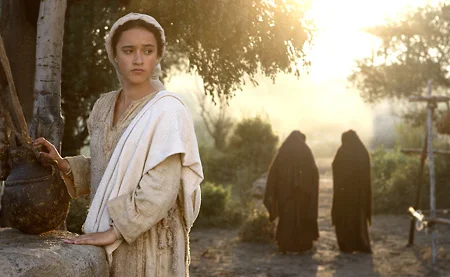 "Mary was greatly troubled at his words and wondered what kind of greeting this might be." (NIV)
"Mary was greatly troubled at his words and wondered what kind of greeting this might be." (NIV)
And this is what we need to know: Mary found herself in a situation that she did not want and that she could not change.
Mary didn't want Joseph to die. If we pick up the book of Tobit-- a book not found in our Protestant scriptures but within the apocrypha held as sacred by our Catholic brothers and sisters-- we read of a popular folk tale that Mary surely would have known. It's the story of a jealous angel who appeared on a bride's wedding night each time she married and killed her bridegroom. One scholar writes, "Against the background of this popular story, the fear of a betrothed girl (Mary) at the appearance of an angel is all the more understandable. Could it be that she thought an evil spirit was threatening her marriage?"[i] Certainly the appearance of an angel before her was nothing that she had ever heard of being a good thing. She hoped that her planned marriage would go to Joseph as had hoped it would.
Then, when Mary was told she would soon be with child, she didn't want to be punished. Being a pregnant before the betrothal period was over was more than a cultural taboo, it was a religious no-no. During the betrothal time, which Mary found herself in with Joseph, she was still living under her father's roof. And, it would be until a year after the betrothal began that she would go to live at Joseph's house and thus have marital relations with him. Thus, for Mary to begin showing her pregnancy from the "overshadowing of the Holy Spirit" would be considered strange, inconceivable and ultimately could cost Mary her life if Joseph didn't claim the baby as his own. The sin of adultery could be placed over her life, unfairly of course.
And, furthermore, Mary probably did not want to be pregnant yet. Though girls married and had children as young as 13 or 14 in this era of time and having children was part of her responsibility to fulfill the laws of the Torah, I can imagine that it wasn't the leap into adulthood that girls like Mary dreamed for themselves. To soon face the potentially life-threatening complications of child-birth when she had not even had time to life much of her own life must have been overwhelming and unfavorable to say the least.
For all of these reasons and probably many more that Mary didn't even have time to think of in this very moment, she found herself in a situation that she didn't want and she couldn't change.
But, what was she to do? Especially as she was learning that this "thing" about to happen to her was from the hands of "the Lord." No longer could she go back to her girly innocence of thinking about goings on in her town. No longer could she be normal just like everyone else. No longer could she silently pray in temple without having to put feet to the words of prayer she had been saying all her life. God was about to change her life. And there were choices in front of her:
1. She didn't have to believe it. She could have said as we heard Zechariah say last week, "How can I be sure of this?" asking for a sign or proof of her pregnancy before she accepted it.
2. She could have balked at this word from the angel. Responding with something like, "No way. You're going to have to find yourself another girl, Gabriel. There ain't no way I am going to carry the 'son of God' in me. That's ridiculous."
And in each of these scenarios, Mary could have found her soul much like the state of my uncle who is dreading the forced gathering with his mother-in-law this Christmas. Bitterness could have crept in. Hatred could have begun to corrode her sweet heart. Having peace, well, Mary would have to kiss that goodbye as she hung on to dreams for her life that would just no longer work for her.
But, then there was another choice and that was to make peace with God. To accept that in our discipleship journey, we might have to endure transitions that are harder than we could have ever imagined. To accept that in this sinful world, often times there are good and even bad things that happen to us that we can't control or make better, as hard as we try. To accept that having this one named Jesus, who would save her people from their sins was the next step for her life.
If we keep reading the text, we know that the final choice-- making peace with God-- was ultimately Mary's chosen path. In verse 38, Mary responds to the angel saying, "Here am I, the servant of the Lord; let it be with him according to your word."
Yet, as quick as the transition is in our text from verse 29 to the acceptance of verse 38, I'd like to think that the transition of this "making peace with God" took longer than it did for Kirby to read this passage for us this morning.
I like to think of Mary as one who joined the great line of saints who were known to wrestle with God when faced with a difficult challenge: Abraham, who didn't want Sodom and Gomorrah destroyed completely, Jacob was willing to fight it out with God until his hip was thrown out of whack, and Hannah who prayed and cried and pleaded until the Lord gave her Samuel, the great prophet of Israel.
That when Mary said, "Here am I... let it be, according to the Lord's word" Mary allowed some things to die. Not in the physical sense of course, but emotionally and spiritually. Letting go of what her expectations and her plans were for her life. Letting go of constantly performing to others' expectations of her. Letting go of hiding innocently in the crowd, believing she was a nobody. Instead, letting peace reign in her being so that her life would exclaim about the Lord, "Let it be." Whatever, you want to come, God, let it be.
Sue Monk Kidd, popular author of the book Secret Life of Bees, writes in her earlier memoir, When the Heart Waits, of her struggle to "let it be." At this juncture in her life she details in the book, perched at middle age with children growing into adolescence and her role as mother and wife changing-- Sue finds herself on a spiritual search to figure out why she was so unhappy. And though it doesn't seem to have a name or a direct cause, Sue begins intentionally stopping more often and seeking to figure out what exactly was going wrong.
And in this process, one afternoon around this time of the year, right before Christmas, Sue went into her attic to get out some Christmas decorations, and found a stack of old Christmas cards in the process. Though she chastises herself upon finding the pile saying, "Why do I insist on being a hoarder of such cards, from as a far back as 15 years ago?" she found herself stopping to re-read some.
As she picked of one of these old cards with a picture of Mary on the front which read on the inside simply, "Let it be," Sue stops and recognizes this moment just for her. Maybe the experience of Mary wasn't as far from her life as she thought. Writing later on: "I sensed that the words were about to take up residence and sing their little aria of letting go."
Sue goes on to make sense of this experience by calling on the wisdom of St. Teresa of Avila. Sue remembers that St. Teresa once compared the soul to a silkworm: "It is necessary for the silkworm to die . . . as it does completing what it was created to do . . . A little butterfly comes forth. Oh, greatness of God! "
And, Sue realized then that God's call for her life was like that of Mary: to let die in her what was of the past, what would not be in the future, so that God could enable new life to spring up in and all around her.
Today, as we sit, also on a journey of waiting, also on a journey of soul-searching called Advent, we too are asked to make peace with God.
I hear people asking me all the time how it is that they can find peace, how it is they can move past the hurt of loss, and how it is that they find God's new plans for them after life-devastating pain. And, to this, I invite us to consider Mary, her witness of making peace with God by letting die in her what could no longer be. Mary ushering in peace, by saying to God, "let it be according to your word."
I can imagine that some if not all of us gathered here today have areas in our life in which we too are in need of peace. And to all of us I say, we too have a choice like Mary did.
So, I ask you what needs to die in you? What do you need to let go? Who do you need to forgive so that as we approach the table this morning, we have the chance to make peace with God?
I hate it that what I must preach this morning is about death to dreams, death to wishes, death to ideas we held dear about our lives-- for death is one of my least favorite things to talk about or to practice myself. But, even with this true, I must tell you today that THIS is the ONLY way to peace. For after all we follow a Christ who died so that we might have life. And, it is our call to way in this way.
Won't you join me at this table this morning. Let us make peace with God before we approach this table as we pray . . .
AMEN
[i] New Interpreters Bible: Luke and John. "Luke 1:26-38 Commentary" 51.